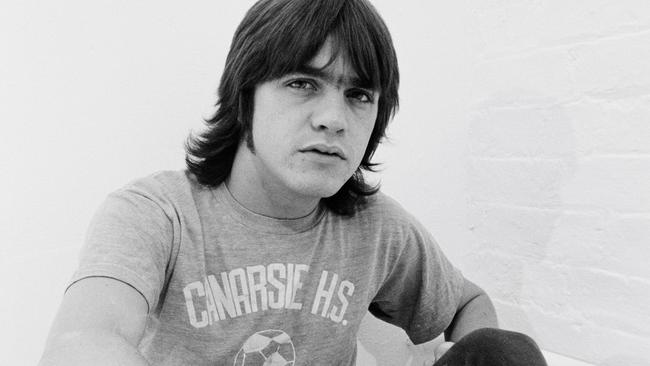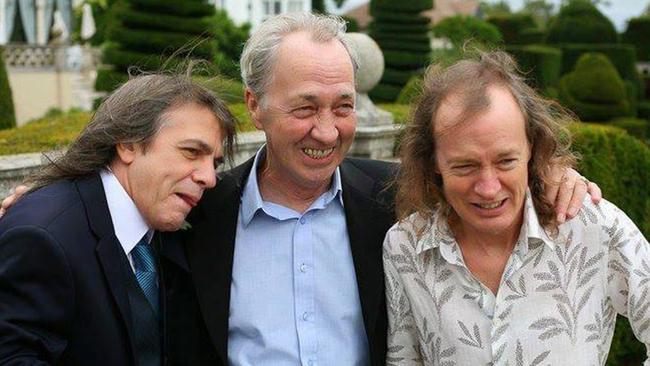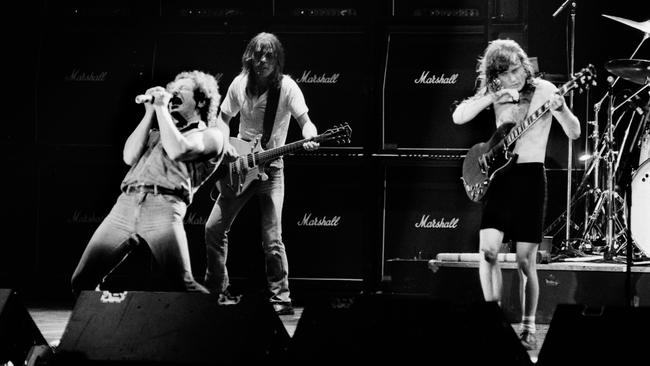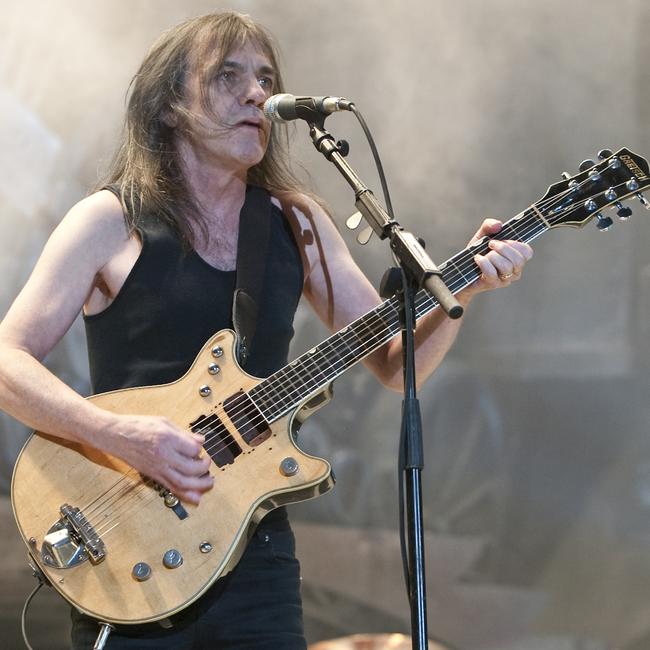AC/DC guitarist Malcolm Young rocked hard on long way to the top
The word humble doesn’t do justice to Malcolm Young’s roots.

Malcolm Young. Born Glasgow, January 6, 1953. Died Sydney, November 18, aged 64.
AC/DC weren’t kidding around when they roared that “it’s a long way to the top”. For Malcolm Young, who died on Saturday at the age of 64, it was a longer road than most. The word humble doesn’t do justice to his roots. When he and his seven siblings — including future Easybeat George and younger brother Angus — arrived in Sydney in 1963 (they were Ten Pound Poms, despite being Scottish), their first port of call was the Villawood Migrant Hostel.
Malcolm later compared life there with a prison camp, although his early years at the Cranhill housing estate in Glasgow were hardly glamorous.
Despite all the success that was to follow — as recently as 2015 he’d splashed out $10 million on a Palm Beach hideaway — Malcolm Young never shook off his working-class roots. Music was a job, not a calling. “I’ve never felt like a pop star — this is a nine-to-five sort of gig,” Malcolm told Rolling Stone in 2008. “It comes from working in the factories, that world. You don’t forget it.”
It was also at Villawood that the first chapter of Malcolm’s musical story was written, when George, along with fellow “inmates” Harry Vanda, Stevie Wright, Dick Diamonde and Gordon “Snowy” Fleet, formed the Easybeats.
By 1965, on the back of such hits as Sorry, Wedding Ring and She’s So Fine, they were the hottest band in the country, and Malcolm was already eyeing off a career in music.
One day he and a friend, fellow muso Herm Kovac, skipped school and came home to play some records. Eyeing one of the Easybeats’ gold discs hanging in the lounge room, they decided to see if the record actually worked on a stereo. It did, sort of, though they were surprised to find that rather than Friday on my Mind, as it read on the label, the song playing was another Easys’ hit, Sorry.
By the late 1960s, with the Youngs now settled in suburban Burwood, Malcolm was already giving Angus tips on how to play the guitar. He’d handed down one of George’s guitars, a Hofner, when Harry Vanda gave him a smart-looking Gretsch. “Don’t tickle it!” he would snap at Angus. “Hit the bugger!” It was sound advice, a tactic Angus — and Malcolm — would employ for the next 40-odd years.

It seemed inevitable that the two siblings would join forces, which they did in 1973, although their father, William, was convinced it would be a short-lived union. They were typical teens, always sniping at each other — Angus, who spent much of his time working away on what a fellow muso called “the longest guitar solo in the history of music”, would hang a Playboy poster on their shared bedroom door when he wanted Malcolm to stay outside, which was often. Disputes often ended in punch-ups.
“You’ll probably kill each other with your guitars,” William told his sons when they told him they’d formed a band. But with the help of sister Margaret — who gave AC/DC their name and advised Angus to wear his school uniform on stage — and big brother/mentor George, who told Malcolm and Angus to keep their sound simple and direct, AC/DC hit the local music scene like a thunderbolt.
Ted Albert, the savvy managing director of the Alberts music empire, who had recently employed George and Harry Vanda as his in-house producers/hit makers, signed the band in 1974. Countdown also took a shine to the band and the hits that followed — It’s a Long Way to the Top, Jailbreak, TNT, High Voltage — became staples on the small screen and radio. The division of creative duties between Malcolm and Angus also became clear: Angus, the lead guitarist, provided the colour, while Malcolm maintained the solid-as-a-rock rhythm. When combined with the hairy-chested flair and lyrical brilliance of Bon Scott, a magical alchemy was created. Schoolboy Angus and the leering Scott became the band’s key focal point; Malcolm, meanwhile, was happy to stay in the background, his diminutive frame dwarfed by the hefty Gretsch guitar he nicknamed The Beast.
Malcolm always lived harder than his younger brother. Angus was a teetotaller, whose only indulgence was cigarettes, spaghetti bolognaise and chocolate milk (which he sometimes sprayed over unsuspecting fans in what was called a “snot cyclone”); Malcolm, however, smoked pot and drank to excess. He’d be seen backstage swigging straight from a bottle of whiskey that seemed to be bigger than the man himself.
But Malcolm was also the most ambitious member of AC/DC. In March 1975 he informed new bassist Mark Evans: “We’ll be in the UK in a year.”
“I didn’t think there was a snowball’s chance in hell of the band being in the UK within a year,” Evans later wrote in his memoir Dirty Deeds, “and I was dead right. It would take a year and 10 days.”

Even the death of Bon Scott in 1980 didn’t stop the band’s relentless momentum. Malcolm and Angus spoke with Scott’s parents at his funeral in Fremantle and they told the brothers to keep going because “that’s what Bon would have wanted”. True to their hardworking roots, within three months they’d not only recruited a replacement, Geordie shouter Brian Johnson, but recorded Back in Black, the album that made the band superstars. Its sales now sit at 50 million units — only topped by Michael Jackson’s Thriller.
Malcolm, like Angus, was a one-woman man, marrying his wife O’Linda in his early 20s. They had two children, Ross and Cara. In 1988 Malcolm went into rehab when his drinking proved so problematic that he sometimes fell about on stage while playing. He never drank again.
It was in 2008 that Malcolm showed the first signs of the dementia that would eventually derail his musical career and contribute to his death. During the marathon tour for the band’s Black Ice album — 168 shows over 20 months to five million paying punters — Malcolm experienced trouble recalling songs he’d been playing for the past 30-odd years. Before every show he’d rehearse those songs, time and again, something he’d never needed to do before. But he didn’t stop playing; the band was his baby, his obsession. “He was his own driver,” Angus said of Malcolm at the time. “He had that thing where you just had to keep going.”

Having already experienced lung surgery and needing a pacemaker for heart problems, Malcolm was diagnosed with dementia in 2014, and became a resident of exclusive Sydney nursing home Lulworth House. Malcolm later sat down with Angus to discuss the future.
When Angus asked if he felt that the group should continue without him, Malcolm was adamant. “Yeah,” he said, “you lot carry on. Keep on making music.” The subsequent Rock or Bust tour, perhaps the last hurrah for the band, grossed a heady $220-plus million from 88 dates.
When news broke of Malcolm’s death — only a month after the death of George Young — Angus spoke of their special chemistry.
“As his brother, it is hard to express in words what he has meant to me during my life; the bond we had was unique and very special. He leaves behind an enormous legacy that will live on forever. Malcolm, job well done.”
Jeff Apter is the author of High Voltage: The Life of Angus Young AC/DC’s Last Man Standing.



To join the conversation, please log in. Don't have an account? Register
Join the conversation, you are commenting as Logout